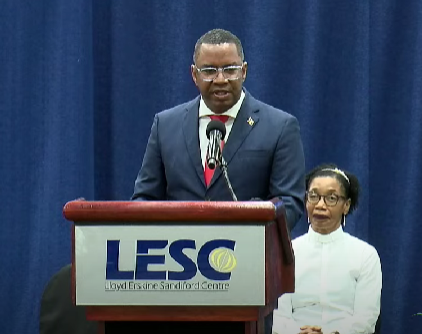Caribbean Urged to Unify for Sustainable Shipping: Addressing GHG Emissions in IMO Negotiations

November 4, 2024
Caribbean states, including Barbados, urged to unite in reducing greenhouse gas emissions from ships to safeguard economic interests. Dr. Jan Yves Remy leads initiative for unified regional approach.
Barbados and other Caribbean states could find themselves in rough waters economically unless they fully join forces and secure the region’s interests in ongoing global efforts to reduce greenhouse gas (GHG) emissions from ships.
Dr Jan Yves Remy, director of the Shridath Ramphal Centre for International Trade Law, Policy and Services at The University of the West Indies, Cave Hill Campus, has flagged the issue as one in need of urgent attention and requiring the Caribbean to get on board with a unified position.
She is leading Caribbean Shipping Lanes, an SRC project supported by the United Nations Foundation. The initiative aims to provide technical support to Caribbean countries engaged in ongoing negotiations at the International Maritime Organisation (IMO) to implement an agreed strategy to reduce GHG emissions from ships.
“The intended measures under the strategy – comprising both technical and economic elements – will be adopted in April 2025 and brought into effect in October 2025,” Remy says.
“I am sure you understand the grave economic importance of these IMO negotiations to the region, both because of our climate vulnerability and our absolute dependence on shipping for our main economic sectors.”
She noted: “Several Caribbean countries have been individually participating in these negotiations, but to date, the region has not taken a unified approach to many of the critical issues on the table.
Belize and Jamaica are reported to have taken a leading role, with support from Antigua and Barbuda, Barbados, Dominica, Grenada, St Lucia, St Kitts and Nevis, St Vincent and the Grenadines, and Trinidad and Tobago.
“At the last set of dedicated IMO meetings held in London in September-October this year, those participating CARICOM delegations provided spirited representation on the issues,” Remy shared.
She added, however, that “it became apparent that the time has come for the region to discuss these matters jointly and secure the necessary technical support and political buy-in”.
The SRC has prepared a high-level briefing note in which it advises that “once adopted by the IMO in 2025 and upon entering into force in 2027, these measures will have significant economic implications for small island developing states (SIDS) like those in the Caribbean, which are highly dependent on maritime shipping for access to the global economy, trade, and employment in shipping and related sectors”.
Achieve objectives
In addition to setting indicative targets to reduce emissions from shipping, the strategy mandates the adoption of binding “mid-term measures” by 2025, which will include both a technical measure (a global fuel standard) and an economic measure (GHG pricing mechanism or levy) to achieve its objectives.
“In the ongoing negotiations under the GHG Reduction Strategy, the Pacific Islands and Belize are leading efforts on behalf of SIDS to ensure that the transition to a cleaner shipping industry remains just and equitable. Their proposal includes a US$150/tonne levy on CO2 emissions combined with a global fuel standard that promotes the use of zero-emissions green fuels,” the document explained.
“Preliminary findings from UNCTAD indicate that this approach is the least disruptive cost option out to 2050, the most supportive to the transition, and that an economic measure in the form of a universal levy provides the best option to offset the cost of the transition costs and fund the just and equitable transition.”
This means that “CARICOM member states therefore have a narrow window of opportunity to shape the design of these measures and mitigate potential impacts on key industries like tourism, food security, and maritime transportation”. It is an effort that requires “political and technical participation from all CARICOM members in the remaining negotiations is critical”, the SRC said. The briefing note’s immediate recommendations for the Caribbean include “developing a unified CARICOM position that includes continued support for a universal levy on GHG emissions as the preferred pricing mechanism as proposed by Belize and the Pacific SIDS; conducting countrylevel further research on the expected economic impacts of the transition; and increasing high-level advocacy to ensure that the Caribbean is not left behind in the global effort to decarbonise the shipping industry”.
The SRC indicated that “whatever the outcome of the ongoing IMO negotiations to reduce emissions from shipping, they will profoundly affect the Caribbean region”.
It said this “is because shipping globally accounts for three per cent of global emissions – which, if considered a country, would rank alongside Germany in terms of emissions – and because the Caribbean region depends heavily on international shipping to be connected to the global economy”. (SC)


